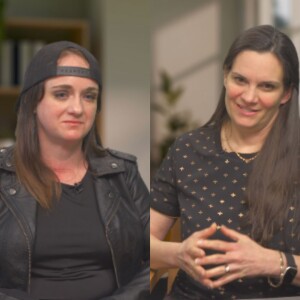
Friday May 03, 2024
#287 Familial Hypercholesterolemia with Jess and Julie
We dive into the journey of a family who unexpectedly discovered a genetic condition and the pivotal role that research at the National Institutes of Health (NIH) played in their understanding and treatment. Joining us are Jess, a patient with a secondary genetic finding, and her genetic counselor, Julie Sapp, from the National Human Genome Research Institute.
Secondary genetic findings, often termed as incidental or unexpected results, can have profound implications for individuals and their families. Today, we explore Jess's experience with receiving such a result and the collaborative efforts between patients, genetic counselors, and researchers in navigating this journey.
Meet Our Guests:
- Jess: A patient who received a secondary genetic finding and embarked on a journey of understanding and treatment.
- Julie Sapp: A genetic counselor at the National Human Genome Research Institute, leading research efforts in the Genomic Services Research Program (GSRP), focusing on individuals with secondary findings.
Julie Chevalier Sapp, PhD, ScM, CGC is a genetic counselor at the Center for Precision Health Research at the National Human Genome Research Institute where she studies social and behavioral questions related to the practice of clinical genomics and genetic counseling. Her research interests include how people and systems make use of genomic data, the implementation of genomic screening, and the clinical utility of genomic techniques. Julie received her genetic counseling degree from the Johns Hopkins/NHGRI genetic counseling training program in 2005 and her PhD in Translational Health Science from the George Washington University in 2024.
Interview Highlights:
- Understanding Secondary Findings:
Julie provides insights into what constitutes a secondary finding in genetic testing and the importance of comprehending associated health risks and outcomes.
- Patient Perspective:
Jess shares her personal experience of receiving a secondary finding and discusses her journey to the Genomic Service Research Program (GSRP) at the NIH.
- Role of Genomic Testing in Diagnosis:
Julie elaborates on how molecular diagnosis obtained through genomic testing contributed to Jess's clinical diagnosis and subsequent healthcare management.
- Importance of Interventions:
Julie emphasizes the significance of interventions and preventive measures in managing genetic conditions like Familial Hypercholesterolemia (FH).
- Challenges and Barriers:
Both Jess and Julie shed light on the challenges patients face in accessing appropriate care and how genetic counselors can support them in navigating these barriers.
- Research Insights and Future Directions:
Julie discusses the insights gained from Jess's case and the broader implications for research and clinical practice in the realm of genomic medicine.
Jess's journey exemplifies the transformative potential of collaborative research efforts in elucidating the complexities of genetic conditions and guiding personalized healthcare interventions. As we continue to advance in genomic research and testing, the experiences shared in this episode underscore the importance of patient-centered care and the invaluable contributions of genetic counselors and researchers alike.
Be sure to check out the National Human Genome Research Institute including their Genomic Services Research Program (GSRP).
Stay tuned for the next new episode of DNA Today next Friday since new episodes are released every Friday! In the meantime, you can binge over 285 other episodes on Apple Podcasts, Spotify, streaming on the website, or any other podcast player by searching, “DNA Today”. Episodes since 2021 are also recorded with video which you can watch on our YouTube channel.
DNA Today is hosted and produced by Kira Dineen. Our social media lead is Corinne Merlino. Our video lead is Amanda Andreoli. Our Outreach Intern is Sanya Tinaikar. Our Social Media Intern is Kajal Patel. And our Graphic Designer Ashlyn Enokian.
See what else we are up to on Twitter, Instagram, Facebook, YouTube and our website, DNAToday.com. Questions/inquiries can be sent to info@DNAtoday.com.
No comments yet. Be the first to say something!